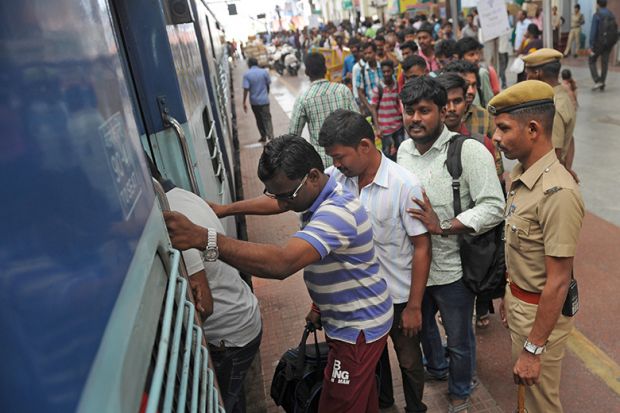Universities across the globe should introduce affirmative action admissions policies to widen access for disadvantaged students, according to a new policy paper from the United Nations Educational, Scientific and Cultural Organisation.
Unesco also calls for governments to cap student loan repayments at 15 per cent of graduates’ monthly earnings, but it rejects policies granting free tuition for all students, claiming that one-size-fits-all programmes have been proven to discriminate against poor students.
The study, “We can make higher education equitable and affordable for all”, written by the Global Education Monitoring (GEM) Report team and the International Institute for Education Planning at Unesco, cites a law in Brazil that stipulates that half of all places at the country’s 63 federal universities are guaranteed to students from public secondary schools, or those of African or indigenous descent.
On affirmative action, Brazilian universities’ admissions policies were changed to reflect the ethnic profile of their state, while lower income students were given bonuses on entrance examinations, the report says.
Meanwhile, in India, 22.5 per cent of all places in educational institutions are reserved for students from tribes and lower castes, it adds.
Affirmative action admissions policies – which can involve quotas for disadvantaged groups, bonuses on test scores or consideration of contextual information about applicants – are controversial.
Two white women who were rejected from the University of Texas at Austin in 2008 took the institution to court, alleging that it had discriminated against them on the basis of their race, but last year the US Supreme Court upheld the university’s consideration of race and ethnicity in college admissions.
Taya Louise Owens, research officer at GEM Report and co-author of the paper, said that although “there is no silver bullet” when it comes to designing admissions policies, evidence “overwhelmingly” demonstrates that any policy that targets a specific under-represented group leads to increased access for that group.
Saying that this was true for countries across the world from Nigeria to Israel to the US, she stated that policies tended to work best when supported by national governments.
“The key thing about affirmative action is that it looks at criteria beyond academic achievement to level the playing field,” she said.
She added that common criticisms against such policies include that they impinge on institutional autonomy and that disadvantaged students might not be prepared academically to attend certain universities.
However, she noted, the 2015 book Race, Class and Affirmative Action, written by the Israeli sociologist Sigal Alon, found that minority students perform better at elite institutions than they do at less prestigious universities.
The Unesco paper also cites several datasets that show that the dramatic rise in university student numbers across the world in recent years has led to increased burdens on families to pay for higher education, leaving disadvantaged students behind.
For example, figures from the 2016 GEM Report show that only 1 per cent of the poorest 25- to 29-year-olds across 76 countries have spent more than four years in higher education, compared with 20 per cent of the richest. In the most extreme case, students from the richest households in the Philippines are 50 times more likely to have achieved this than those from the poorest.
Meanwhile, on average, only 8 per cent of young adults are enrolled at universities in the poorest countries, compared with 74 per cent in the richest nations.
Register to continue
Why register?
- Registration is free and only takes a moment
- Once registered, you can read 3 articles a month
- Sign up for our newsletter
Subscribe
Or subscribe for unlimited access to:
- Unlimited access to news, views, insights & reviews
- Digital editions
- Digital access to THE’s university and college rankings analysis
Already registered or a current subscriber? Login








